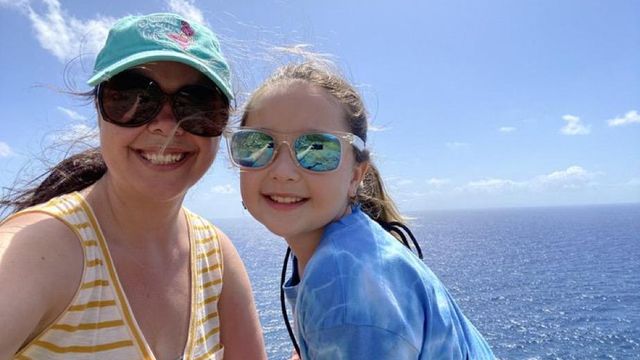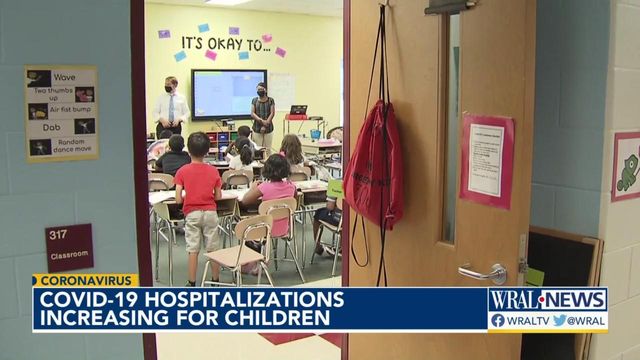With full FDA approval, can doctors now give kids under 12 a COVID vaccine? Not so fast
With the U.S. Food and Drug Administration's full approval of Pfizer's COVID-19 vaccine on Monday, doctors can now legally prescribe the product for off-label use. And for some parents who are eager to get their young children vaccinated, especially as the delta variant picks up and school opens, it offered a glimmer of hope.
Posted — UpdatedSo, can doctors now prescribe the vaccine for children under the age of 12 even though it hasn't been approved for their use? It would be legal, shared Dr. Tony Moody, a professor in the Department of Pediatrics at Duke University School of Medicine, by email. But it wouldn't be advisable, he added.
"Once a product is licensed, physicians are allowed to prescribe off-label, but they are not shielded from the consequences of doing so," shared Dr. Moody, who also is on the leadership team of the Duke Human Vaccine Institute. "Physicians do this all the time, and it’s a very common practice in pediatrics where in the past we may have had limited data on dosing but needed options to treat children. That being said, the pediatric COVID vaccine trials are using different dosing compared to adults, so giving an adult dose may raise the chance of side effects. While I sympathize with parents’ desires to accelerate getting their child the vaccine, I recommend letting the process play out."
'Every parent I know is anxious'
Patti Mulligan said when she heard about the FDA's approval of the Pfizer vaccine, she immediately called her pediatrician.
"We’ve continued to be really worried about exposure to my younger daughter, because the only thing she can really do to protect herself is mask up, which she does," Mulligan said of her 9-year-old daughter, Lilah. "I just want to get her as protected as possible, because even when kids get a mild case of COVID, we don’t know what the long-term effects of that will be."
Mulligan said the rest of her family is vaccinated for COVID-19. She said that Lilah worries a lot about catching the virus.
"It’s really painful to see your young child walking around life worrying about catching a deadly disease, and I would like to at least give her some peace of mind as well," Mulligan said. "Every parent I know is worried about this. Every parent I know is anxious."
The COVID-19 vaccination is currently available for those ages 12 years and older.
"There are plenty of people who have had the opportunity to get shots who have declined that opportunity and because they’ve declined it, my kid is still at risk," Mulligan said. "If other people had done their part to protect our community and protect our kids, then I wouldn’t be so worried about getting her vaccinated now."
Mulligan said she knows that her pediatrician could decide to deny her request on Wednesday during their scheduled appointment.
"My first response would be to advocate for them to do it, but if not I guess we wait and continue to worry," Mulligan said.
Pediatrics group warns against off-label use
"This is their official stance that the vast majority of pediatricians, myself included, would abide by at this time," Dr. Thompson wrote in an email.
Dr. Thompson also cited the need for vaccine-recommending bodies to analyze the data from ongoing clinical trials in children before officially recommending their use. The FDA, she said, is requiring at least six months of clinical trial data for children before recommending it for emergency use. For adults, it was three months of data. Dosing, she said, also may differ depending on the age and size of the child.
"Finally, it is of utmost importance for the general public to trust these vaccines in children; in order to gain and keep this trust, we must go through the FDA’s regulatory process to ensure safety and efficacy," Dr. Thompson said. "I understand the concern of parents and applaud them for wanting their children to be protected as they go back to school. I too am anxiously awaiting emergency use approval of COVID vaccines for younger children."
Limited vaccine options for kids
On Monday, the FDA's full approval for the Pfizer vaccine covered its use for people 16 and up. It also is available for kids ages 12 to 15 under emergency use authorization. The Pfizer vaccine currently is the only option in the United States that is allowed for kids ages 12 and up. Dr. Thompson said that she expects the Pfizer option will be approved for emergency use for younger children in the coming months. Clinical trials in children for both the Moderna and Johnson & Johnson vaccines continue.
"I also expect to see full FDA approval for the Pfizer vaccine for ages 12 to 15 years in the coming months," Dr. Thompson said.
Precautions remain key
Until it's approved for young kids, both Dr. Thompson and Dr. Moody recommend that parents continue to take other precautions.
"Until COVID vaccines are approved for use in children under 12, parents should focus on what we know works: following precautions," Dr. Thompson said. "Wear your masks in indoor, public places. Make sure your children are wearing their masks at school. Maintain physical distancing. Encourage those around your children (parents, grandparents, aunts and uncles, siblings over 12) who are eligible for COVID vaccines to receive them. We can get through this waiting period together if we take the appropriate precautions."
Practice good behaviors, Dr. Moody said, and don't take excessive risks.
"I do not advocate putting yourself in a bubble," he said. "I do advocate thinking about the situations you are putting yourself and your family into and thinking about the risks and benefits, and also think about what you can do to mitigate those risks. For example, small gatherings are inherently less risky than large ones, gatherings where people are masked and/or outdoors are lower risk than unmasked indoor gatherings, and bringing more people into your circle is riskier than keeping the circle more contained. So, I do not advise people being hermits, and I also do not advise that people abandon all precautions."
For parents eager to get their young children vaccinated, Dr. Moody also recommended considering signing them up for a clinical trial.
"Enrolling in one of the clinical trials is an excellent way to get people vaccinated earlier," he said. "Of course the studies are placebo controlled, so there is a chance that your child could be in the placebo arm, but once the trials have demonstrated efficacy all studies have moved to vaccinating all participants because of the benefits. I participated in the Moderna trial, was in the placebo arm, and got vaccinated right after the [emergency use authorization] came out for that vaccine."
• Credits
Copyright 2024 by Capitol Broadcasting Company. All rights reserved. This material may not be published, broadcast, rewritten or redistributed.





